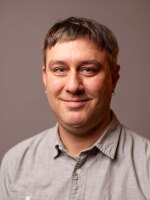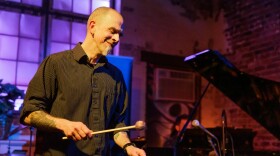Bill Anschell has built a reputation as a first-call pianist with jazz musicians around the Northwest for more than 20 years, and he’s also a composer and leader of his own bands.
That’s a reputation developed on acoustic piano, but last year Anschell released his first album bringing together synthesized sounds and real musicians. Improbable Solutions, featuring digitally altered piano and decorated with electronic sounds, was not Anschell’s first experience with electronics as a musician.
He shared more in a 2024 KNKX Studio Session:
On developing an interest in electronic music from a young age
I started with progressive rock and then when I found fusion that had synthesizers in it – that was kind of the next step. When I was in college, I was in a rock band and I had a mini-Moog and I was actually — I was at Oberlin — if I could have majored in electronic music, I would have done it.
The modern era came and anybody can have a recording studio and all the synthesizers they want for, like, 10 bucks each. So I started doing completely electronic projects with no acoustic instruments. The best thing I did was actually scoring a podcast for KNKX.
On how this “acoustic-piano-trio-plus-electronic-sound-design” for Improbable Solutions came together
So, I totally cheated on this. My previous CD was the exact opposite – that we went in a studio like this, we didn’t fix anything, we just played for a few hours. On this new CD, I broke all the rules. I actually pre-recorded my piano parts before I had the bass and drums come in. You’ll never be able to tell by listening to it because they’re still reacting to what they hear. And I could even react to the way they reacted to what I played because after they had recorded their parts, I went back in and tweaked the piano parts some more.
On how the way he composes lends itself to this type of project
Well, I have good enough ears that I can hear what I write in my head – even multiple parts. A lot of people fall into playing what their hands want to play, what feels good, and I don’t want that to happen. So, after I write the tunes, then I go to the piano, make sure they sound the way I thought they would or see if I can find anyway to improve them. I do tweak them quite a bit.
On the tracks he can, and can't, recreate live
There are nine tunes on the album, we do five of them [live.] I picked the tunes that I thought we could do justice to. There are some… a couple of the tunes really are more like progressive rock. A few of them are. And, uh, we’re not really the band for that. You know, me in my studio and then bringing other people in – that’s one thing, but we’re not progressive rock. I don’t think anybody here loves progressive rock, right? I mean, I don’t even anymore, really!
On being a popular supporting musician and a band leader
I look forward to doing it because it’s my music and I like hearing my music. I don’t look forward to really being the guy in charge. It takes your mind a little bit off of improvising and what you’re playing because you’re thinking ‘What am I gonna say next?’ or ‘Is that OK, what I just did?’ I don’t know. I like the challenge of being a sideman and it’s different every time, but I like leading a band because I get to play with the people I like.







